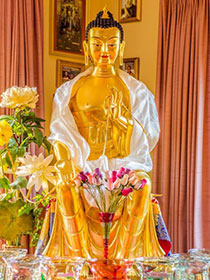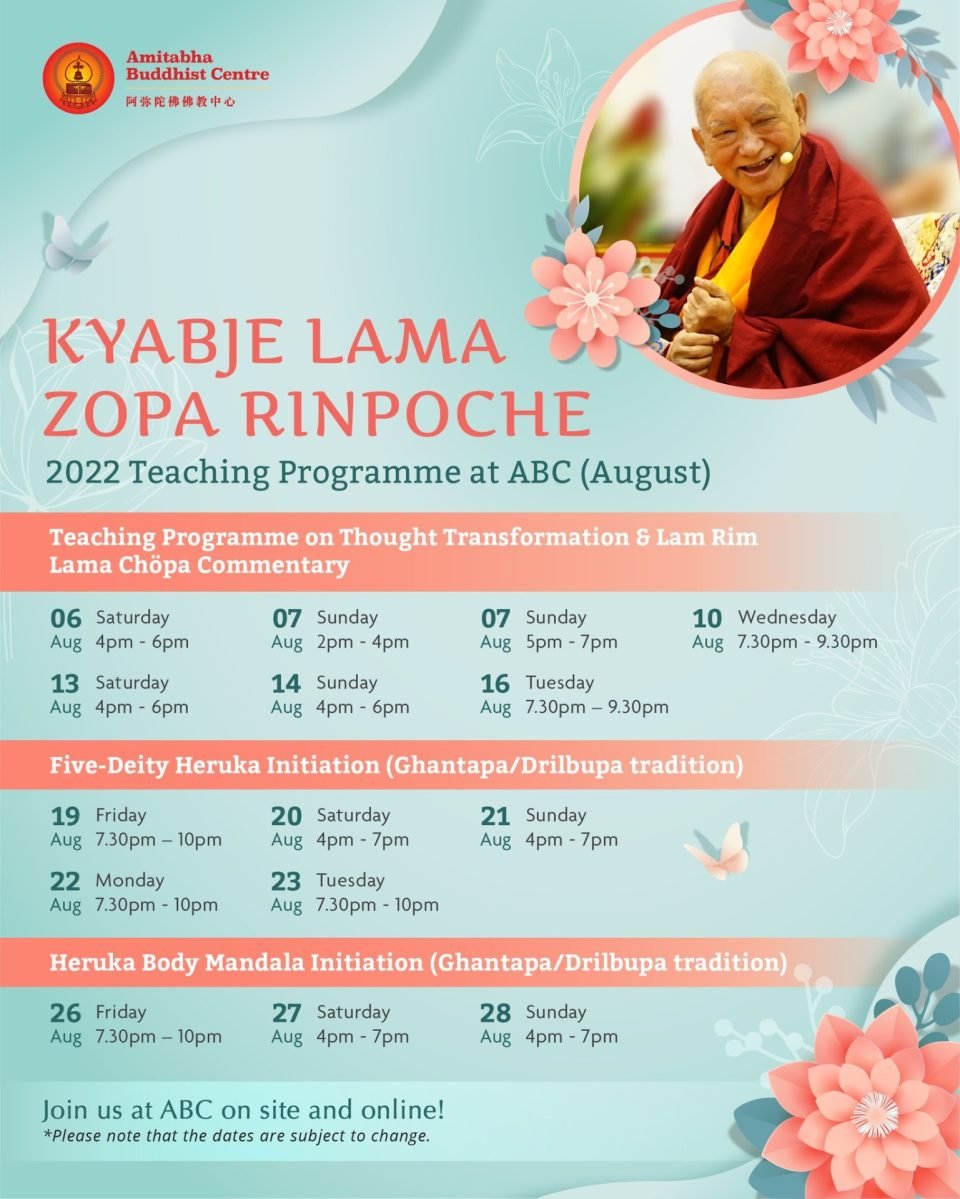- Home
- FPMT Homepage
Foundation for the Preservation of the Mahayana Tradition
The FPMT is an organization devoted to preserving and spreading Mahayana Buddhism worldwide by creating opportunities to listen, reflect, meditate, practice and actualize the unmistaken teachings of the Buddha and based on that experience spreading the Dharma to sentient beings. We provide integrated education through which people’s minds and hearts can be transformed into their highest potential for the benefit of others, inspired by an attitude of universal responsibility and service. We are committed to creating harmonious environments and helping all beings develop their full potential of infinite wisdom and compassion. Our organization is based on the Buddhist tradition of Lama Tsongkhapa of Tibet as taught to us by our founders Lama Thubten Yeshe and Lama Thubten Zopa Rinpoche.
- Willkommen
Die Stiftung zur Erhaltung der Mahayana Tradition (FPMT) ist eine Organisation, die sich weltweit für die Erhaltung und Verbreitung des Mahayana-Buddhismus einsetzt, indem sie Möglichkeiten schafft, den makellosen Lehren des Buddha zuzuhören, über sie zur reflektieren und zu meditieren und auf der Grundlage dieser Erfahrung das Dharma unter den Lebewesen zu verbreiten.
Wir bieten integrierte Schulungswege an, durch denen der Geist und das Herz der Menschen in ihr höchstes Potential verwandelt werden zum Wohl der anderen – inspiriert durch eine Haltung der universellen Verantwortung und dem Wunsch zu dienen. Wir haben uns verpflichtet, harmonische Umgebungen zu schaffen und allen Wesen zu helfen, ihr volles Potenzial unendlicher Weisheit und grenzenlosen Mitgefühls zu verwirklichen.
Unsere Organisation basiert auf der buddhistischen Tradition von Lama Tsongkhapa von Tibet, so wie sie uns von unseren Gründern Lama Thubten Yeshe und Lama Thubten Zopa Rinpoche gelehrt wird.
- Bienvenidos
La Fundación para la preservación de la tradición Mahayana (FPMT) es una organización que se dedica a preservar y difundir el budismo Mahayana en todo el mundo, creando oportunidades para escuchar, reflexionar, meditar, practicar y actualizar las enseñanzas inconfundibles de Buda y en base a esa experiencia difundir el Dharma a los seres.
Proporcionamos una educación integrada a través de la cual las mentes y los corazones de las personas se pueden transformar en su mayor potencial para el beneficio de los demás, inspirados por una actitud de responsabilidad y servicio universales. Estamos comprometidos a crear ambientes armoniosos y ayudar a todos los seres a desarrollar todo su potencial de infinita sabiduría y compasión.
Nuestra organización se basa en la tradición budista de Lama Tsongkhapa del Tíbet como nos lo enseñaron nuestros fundadores Lama Thubten Yeshe y Lama Zopa Rinpoche.
A continuación puede ver una lista de los centros y sus páginas web en su lengua preferida.
- Bienvenue
L’organisation de la FPMT a pour vocation la préservation et la diffusion du bouddhisme du mahayana dans le monde entier. Elle offre l’opportunité d’écouter, de réfléchir, de méditer, de pratiquer et de réaliser les enseignements excellents du Bouddha, pour ensuite transmettre le Dharma à tous les êtres. Nous proposons une formation intégrée grâce à laquelle le cœur et l’esprit de chacun peuvent accomplir leur potentiel le plus élevé pour le bien d’autrui, inspirés par le sens du service et une responsabilité universelle. Nous nous engageons à créer un environnement harmonieux et à aider tous les êtres à épanouir leur potentiel illimité de compassion et de sagesse. Notre organisation s’appuie sur la tradition guéloukpa de Lama Tsongkhapa du Tibet, telle qu’elle a été enseignée par nos fondateurs Lama Thoubtèn Yéshé et Lama Zopa Rinpoché.
Visitez le site de notre Editions Mahayana pour les traductions, conseils et nouvelles du Bureau international en français.
Voici une liste de centres et de leurs sites dans votre langue préférée
- Benvenuto
L’FPMT è un organizzazione il cui scopo è preservare e diffondere il Buddhismo Mahayana nel mondo, creando occasioni di ascolto, riflessione, meditazione e pratica dei perfetti insegnamenti del Buddha, al fine di attualizzare e diffondere il Dharma fra tutti gli esseri senzienti.
Offriamo un’educazione integrata, che può trasformare la mente e i cuori delle persone nel loro massimo potenziale, per il beneficio di tutti gli esseri, ispirati da un’attitudine di responsabilità universale e di servizio.
Il nostro obiettivo è quello di creare contesti armoniosi e aiutare tutti gli esseri a sviluppare in modo completo le proprie potenzialità di infinita saggezza e compassione.
La nostra organizzazione si basa sulla tradizione buddhista di Lama Tsongkhapa del Tibet, così come ci è stata insegnata dai nostri fondatori Lama Thubten Yeshe e Lama Zopa Rinpoche.
Di seguito potete trovare un elenco dei centri e dei loro siti nella lingua da voi prescelta.
- 欢迎 / 歡迎
简体中文
“护持大乘法脉基金会”( 英文简称:FPMT。全名:Foundation for the Preservation of the Mahayana Tradition) 是一个致力于护持和弘扬大乘佛法的国际佛教组织。我们提供听闻,思维,禅修,修行和实证佛陀无误教法的机会,以便让一切众生都能够享受佛法的指引和滋润。
我们全力创造和谐融洽的环境, 为人们提供解行并重的完整佛法教育,以便启发内在的环宇悲心及责任心,并开发内心所蕴藏的巨大潜能 — 无限的智慧与悲心 — 以便利益和服务一切有情。
FPMT的创办人是图腾耶喜喇嘛和喇嘛梭巴仁波切。我们所修习的是由两位上师所教导的,西藏喀巴大师的佛法传承。
繁體中文
護持大乘法脈基金會”( 英文簡稱:FPMT。全名:Found
ation for the Preservation of the Mahayana Tradition ) 是一個致力於護持和弘揚大乘佛法的國際佛教組織。我們提供聽聞, 思維,禪修,修行和實證佛陀無誤教法的機會,以便讓一切眾生都能 夠享受佛法的指引和滋潤。 我們全力創造和諧融洽的環境,
為人們提供解行並重的完整佛法教育,以便啟發內在的環宇悲心及責 任心,並開發內心所蘊藏的巨大潛能 — 無限的智慧與悲心 – – 以便利益和服務一切有情。 FPMT的創辦人是圖騰耶喜喇嘛和喇嘛梭巴仁波切。
我們所修習的是由兩位上師所教導的,西藏喀巴大師的佛法傳承。 察看道场信息:
- FPMT Homepage
- News/Media
-
- Study & Practice
-
-
- About FPMT Education Services
- Latest News
- Programs
- New to Buddhism?
- Buddhist Mind Science: Activating Your Potential
- Heart Advice for Death and Dying
- Discovering Buddhism
- Living in the Path
- Exploring Buddhism
- FPMT Basic Program
- FPMT Masters Program
- FPMT In-Depth Meditation Training
- Maitripa College
- Lotsawa Rinchen Zangpo Translator Program
- Universal Education for Compassion & Wisdom
- Online Learning Center
-
- Prayers & Practice Materials
- Overview of Prayers & Practices
- Full Catalogue of Prayers & Practice Materials
- Explore Popular Topics
- Benefiting Animals
- Chenrezig Resources
- Death & Dying Resources
- Lama Chopa (Guru Puja)
- Lama Zopa Rinpoche: Compendium of Precious Instructions
- Lama Zopa Rinpoche: Life Practice Advice
- Lama Zopa Rinpoche Practice Series
- Lamrim Resources
- Mantras
- Prayer Book Updates
- Purification Practices
- Sutras
- Thought Transformation (Lojong)
- Audio Materials
- Dharma Dates - Tibetan Calendar
- Translation Services
- Publishing Services
- Ways to Offer Support
- Prayers & Practice Materials
-
- Teachings and Advice
- Find Teachings and Advice
- Lama Zopa Rinpoche Advice Page
- Lama Zopa Rinpoche: Compendium of Precious Instructions
- Lama Zopa Rinpoche Video Teachings
- ༧སྐྱབས་རྗེ་བཟོད་པ་རིན་པོ་ཆེ་མཆོག་ནས་སྩལ་བའི་བཀའ་སློབ་བརྙན་འཕྲིན།
- Podcasts
- Lama Yeshe Wisdom Archive
- Buddhism FAQ
- Dharma for Young People
- Resources on Holy Objects
- Teachings and Advice
-
-
*If a menu item has a submenu clicking once will expand the menu clicking twice will open the page.
-
-
- Centers
-
- Teachers
-
- Projects
-
-
-
-
*If a menu item has a submenu clicking once will expand the menu clicking twice will open the page.
-
-
- FPMT
-
-
-
-
-
According to the Buddhist view, there is no human problem that cannot be solved by human beings.
Lama Thubten Yeshe
-
-
-
- Shop
-
-
-
The Foundation Store is FPMT’s online shop and features a vast selection of Buddhist study and practice materials written or recommended by our lineage gurus. These items include homestudy programs, prayers and practices in PDF or eBook format, materials for children, and other resources to support practitioners.
Items displayed in the shop are made available for Dharma practice and educational purposes, and never for the purpose of profiting from their sale. Please read FPMT Foundation Store Policy Regarding Dharma Items for more information.
-
-
Lama Zopa Rinpoche News and Advice
1
Lama Zopa Rinpoche’s August Program
August 6-16, 2022: Teachings on thought transformation, lamrim, and Lama Chöpa commentary. These teachings, including the initial sessions of the Lama Chöpa commentary, will be open to all without any prerequisites, and will also be streamed live on FPMT Facebook and YouTube.
August 19-23: Five-Deity Heruka Initiation. Available onsite at ABC only.
August 26-28: Heruka Body Mandala Initiation. Available onsite at ABC only.
Information about registration, prerequisites, practice commitments, and other information can be found on ABC’s recent newsletter. Specific times of teachings are listed on the flyer above, and please do note that the times are listed according to local time in Singapore.
Watching the Livestream of the August 6-16 Teachings:
Please subscribe to the FPMT YouTube channel to get notified when the stream starts.
- Read how to GET NOTIFIED when a stream starts.
- Pour savoir comment recevoir une notification quand le live commence, cliquez ici.
- Para saber como recibir una notificación cuando comienza la transmisón, pulsa aquí.
- Leggi come ESSERE INFORMATO quando comincia la diretta streaming.
Lama Zopa Rinpoche is the spiritual director of the Foundation for the Preservation of Mahayana Tradition (FPMT), a Tibetan Buddhist organization dedicated to the transmission of the Mahayana Buddhist tradition and values worldwide through teaching, meditation and community service.
27
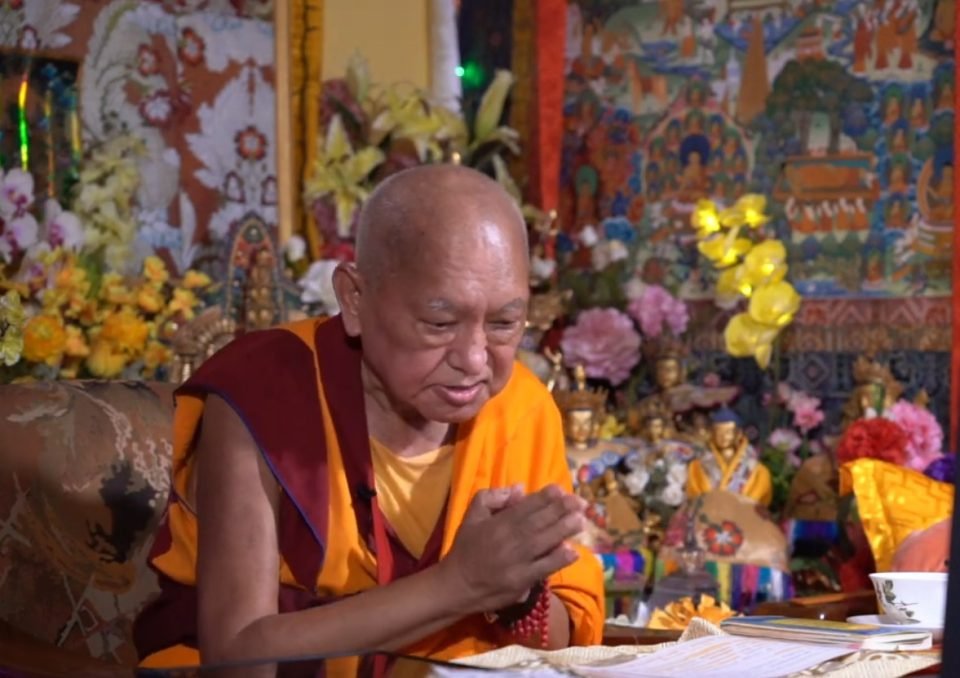
Lama Zopa Rinpoche offering Thought Transformation teachings to Russian students via Zoom from Kopan Monastery, Nepal, June 26, 2022.
Lama Zopa Rinpoche continues his video teachings on thought transformation. Here is a summary of a teaching given on June 26 from Kopan Monastery, Nepal, at the request of Telo Tulku Rinpoche, Ganden Tendar Ling FPMT Buddhist Center, Aryadeva FPMT Study Group, and the Save Tibet Foundation in Russia.
The first kindness of sentient beings is that they are the source of all past, present, and future happiness including enlightenment, Lama Zopa Rinpoche reminds us. They are from whom we receive Buddha, Dharma, and Sangha and in whom we take refuge. A buddha comes from a bodhisattva. A bodhisattva comes from bodhichitta, and bodhichitta comes from great compassion. Great compassion comes from all those sentient beings whose minds are obscured and suffering including every hell being, every hungry ghost, every animal, every human being, every sura, and every asura being.
Before you practice thought transformation, you have to understand that sentient beings are so precious and we must stop harming others. If we remember the kindness of sentient beings, naturally we will respect them and the mind will be less depressed.
Rinpoche discusses “the second kindness,” the kindness of sentient beings when they were our human mother (55:30). Rinpoche offers commentary on several points related to this, including: All sentient beings have been your mother; your mother gave you a human body; your mother protected you from hundreds of dangers every day; your mother bore hardships for you; your mother educated you in the ways of the world; and your mother created much negative karma for you.
The “third kindness” is that our shelter, food, and clothing came from the kindness of sentient beings (1:13:47).
Sentient beings are like a guru, Rinpoche explains. They are wish-granting jewels more precious than gold, diamonds, or sapphires. Cherishing even one sentient being brings us to enlightenment. In fact, the happiness of all sentient beings is in our hands.
We invite you to go deeper into the topics presented here, plus many others, by watching Rinpoche’s video and reading the full transcript of Rinpoche’s teaching.
- Read the transcript of Rinpoche’s teaching
- Find Rinpoche’s Teachings on Thought Transformation translated into various languages.
- Dedication verses
Summary of Lama Zopa Rinpoche’s teaching by Carina Rumrill based on the transcript by Ven. Joan Nicell with editorial input and additions by Justin Jenkins. This summary is meant to highlight key topics presented by Rinpoche in the recorded video and is not intended to serve as a full representation of Rinpoche’s teaching, which is best received through watching the video and/or reading the full transcript.
Watch more from the video series Lama Zopa Rinpoche’s Teachings on Thought Transformation and find links to videos in transcripts, MP3s, additional practice advice, and more:
https://fpmt.org/fpmt/announcements/resources-for-coronavirus-pandemic/advice-from-lama-zopa-rinpoche-for-coronavirus/
You can listen to this teaching on our full-length-teachings podcast as well:
https://fpmt.org/media/podcasts/
Lama Zopa Rinpoche is the spiritual director of the Foundation for the Preservation of Mahayana Tradition (FPMT), a Tibetan Buddhist organization dedicated to the transmission of the Mahayana Buddhist tradition and values worldwide through teaching, meditation and community service.
- Tagged: advice from lama zopa rinpoche, coronavirus, lama zopa rinpoche thought transformation video teaching, video
26
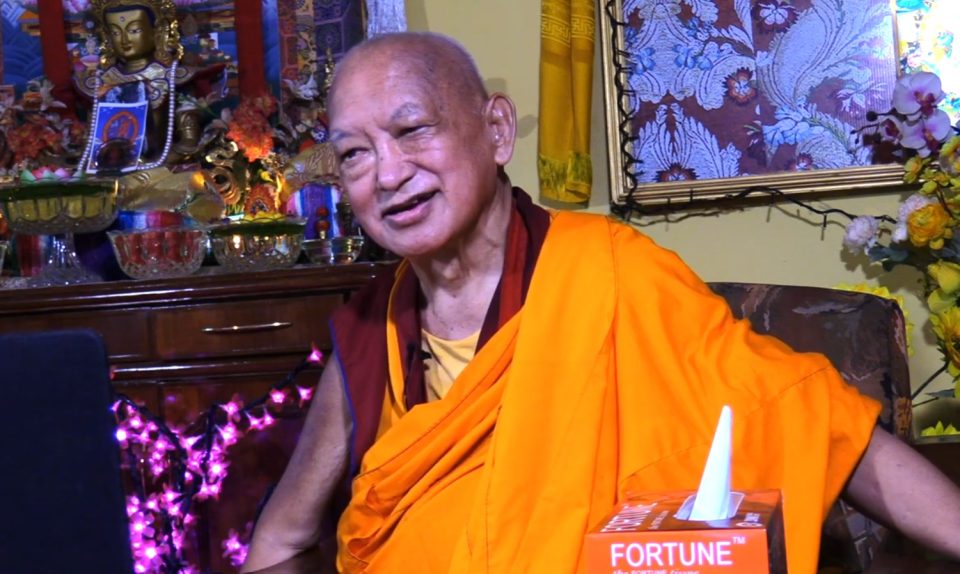
Lama Zopa Rinpoche offering Thought Transformation teachings to Russian students via Zoom from Kopan Monastery, Nepal, on June 25, 2022.
Lama Zopa Rinpoche continues his video teachings on thought transformation. Here is a summary of a teaching given on June 25 from Kopan Monastery, Nepal, at the request of Telo Tulku Rinpoche, Ganden Tendar Ling FPMT Buddhist Center, Aryadeva FPMT Study Group, and the Save Tibet Foundation in Russia.
The foundation of thought transformation is to stop harming others, Rinpoche explains. When anything undesirable happens to us, we believe it came from outside, we never relate it to our own mind. If we didn’t harm others in the past, nobody could harm us in the present time. If we are harmed by people or animals, anger arises and we want to harm them back, we view them as an enemy. If we really want to stop experiencing harm, we have to learn and understand karma, we have to stop harming others.
Happiness and suffering in life depends on how we think. If we want less problems in life, then we must look at the situation as positive and healthy. The more we can look at things as positive, the less angry we will be. Then life isn’t destroyed by anger, our liberation from samsara isn’t destroyed by anger, our enlightenment isn’t destroyed by anger. The more we can look at miserable or bad conditions as positive, the more patience and good heart develops, the more compassion toward others we have. Thought transformation means we look at bad conditions as positive.
When we practice Dharma, we take care of the world. If we think in a positive way, there is peace for oneself and peace for others—we can bring peace to the world and in our family by practicing Dharma. Practicing Dharma means taking care of the mind and benefiting others. Happiness follows a good heart and suffering follows a bad heart. With a good heart, when we speak to someone or undertake any activity—it becomes virtue, the result is only happiness. This is why it is very important, in any action of body, speech, and mind in daily life, before we start, generate a good heart, a Dharma mind. Then every action becomes Dharma.
We invite you to go deeper into the topics presented here, plus many others, by watching Rinpoche’s video and reading the full transcript of Rinpoche’s teaching.
- Read the transcript of Rinpoche’s teaching
- Find Rinpoche’s Teachings on Thought Transformation translated into various languages.
- Dedication verses
Summary of Lama Zopa Rinpoche’s teaching by Carina Rumrill based on the transcript by Ven. Joan Nicell with editorial input and additions by Justin Jenkins. This summary is meant to highlight key topics presented by Rinpoche in the recorded video and is not intended to serve as a full representation of Rinpoche’s teaching, which is best received through watching the video and/or reading the full transcript.
Watch more from the video series Lama Zopa Rinpoche’s Teachings on Thought Transformation and find links to videos in transcripts, MP3s, additional practice advice, and more:
https://fpmt.org/fpmt/announcements/resources-for-coronavirus-pandemic/advice-from-lama-zopa-rinpoche-for-coronavirus/
You can listen to this teaching on our full-length-teachings podcast as well:
https://fpmt.org/media/podcasts/
Lama Zopa Rinpoche is the spiritual director of the Foundation for the Preservation of Mahayana Tradition (FPMT), a Tibetan Buddhist organization dedicated to the transmission of the Mahayana Buddhist tradition and values worldwide through teaching, meditation and community service.
- Tagged: advice from lama zopa rinpoche, coronavirus, lama zopa rinpoche thought transformation video teaching, thought transformation, video
21
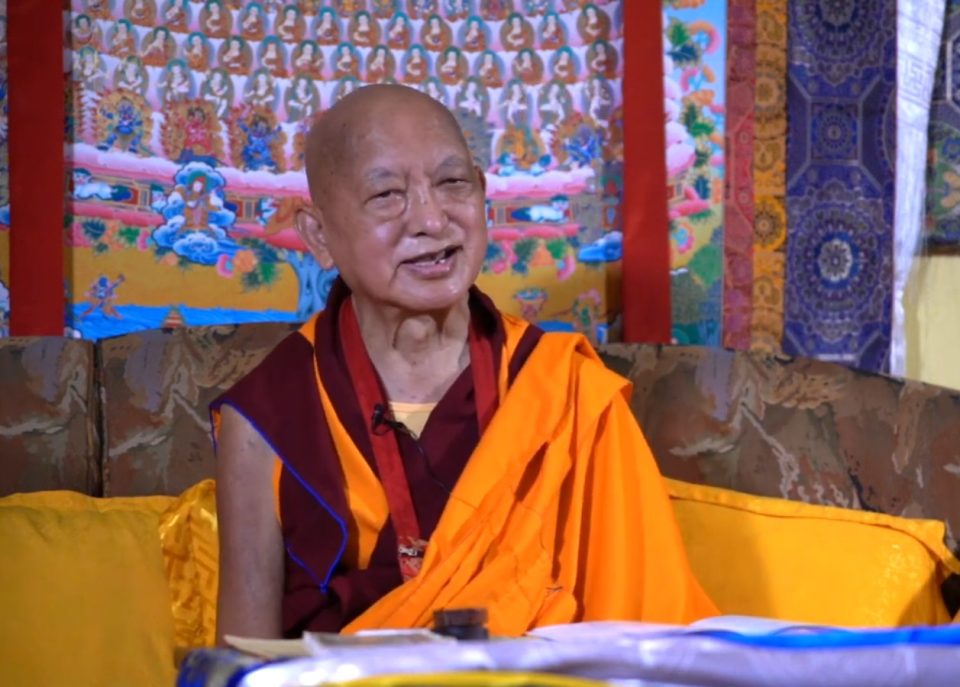
Lama Zopa Rinpoche giving “Your Main Practice in Life Should Be Cherishing Others” teaching on June 13, 2022 from Kopan Monastery.
Lama Zopa Rinpoche continues his video teachings on thought transformation from Kopan Monastery in Nepal. Here is a summary of a teaching he offered to students from China and Malaysia via Zoom on June 13:
All of the 84,000 teachings of Buddha are included in the advice to not harm sentient beings and to benefit them, Rinpoche explains. If we harm sentient beings, we can’t benefit them. All of the suffering we experience ourselves, as well as the suffering we cause others to experience, is caused by our self-cherishing thought. Our worst enemy is our self-cherishing thought. From Shantideva’s Bodhicharyavatara (v. 8.120):
If you want to quickly guide
Yourself and others,
Secretly practice
Exchanging yourself and others.
The conclusion, Rinpoche explains, is that the solution to our problems is bodhichitta. Our main practice in life should be bodhichitta, cherishing others. Without giving up the I, we cannot abandon suffering. The less self-cherishing and the more we cultivate the good heart, the less problems we have.
Rinpoche discusses the kindness of mother sentient beings, and also the kindness of those who are not your mother starting at (1:07:28) in the video, and on page 17 of the transcript.
In preparation for offering the refuge ceremony, Rinpoche discusses four of the five lay vows which one can take in addition to refuge. One can take refuge alone or any/all of the following vows in addition: the vow to abandon killing (1:16:57), the vow to abandon sexual misconduct (1:19:43), the vow to abandon stealing (1:20:27), the vow to abandon lying (Rinpoche did not discuss this vow in this teaching), the vow to abandon alcohol (1:21:37).
Rinpoche offers the refuge ceremony at (1:24:48).
Rinpoche offered an eleven-part series of teachings on refuge in the thought transformation series starting at video 116 on September 26, 2021, and ending with video 126 on June 13, 2022.
We invite you to go deeper into the topics presented here, plus many others, by watching Rinpoche’s video and reading the full transcript of Rinpoche’s teaching.
Watch Lama Zopa Rinpoche’s teaching “Your Main Practice in Life Should Be Cherishing Others”:
- Read the transcript of Rinpoche’s teaching
- Find Rinpoche’s Teachings on Thought Transformation translated into various languages.
- The Foundation Store offers many resources for your practice of refuge.
- Dedication verses
Summary of Lama Zopa Rinpoche’s teaching by Carina Rumrill based on the transcript by Ven. Joan Nicell with editorial input and additions by Justin Jenkins. This summary is meant to highlight key topics presented by Rinpoche in the recorded video and is not intended to serve as a full representation of Rinpoche’s teaching, which is best received through watching the video and/or reading the full transcript.
Watch more from the video series Lama Zopa Rinpoche’s Teachings on Thought Transformation and find links to videos in transcripts, MP3s, additional practice advice, and more:
https://fpmt.org/fpmt/announcements/resources-for-coronavirus-pandemic/advice-from-lama-zopa-rinpoche-for-coronavirus/
You can listen to this teaching on our full-length-teachings podcast as well:
https://fpmt.org/media/podcasts/
Lama Zopa Rinpoche is the spiritual director of the Foundation for the Preservation of Mahayana Tradition (FPMT), a Tibetan Buddhist organization dedicated to the transmission of the Mahayana Buddhist tradition and values worldwide through teaching, meditation and community service.
- Tagged: advice from lama zopa rinpoche, coronavirus, lama zopa rinpoche thought transformation video teaching, refuge, video
19
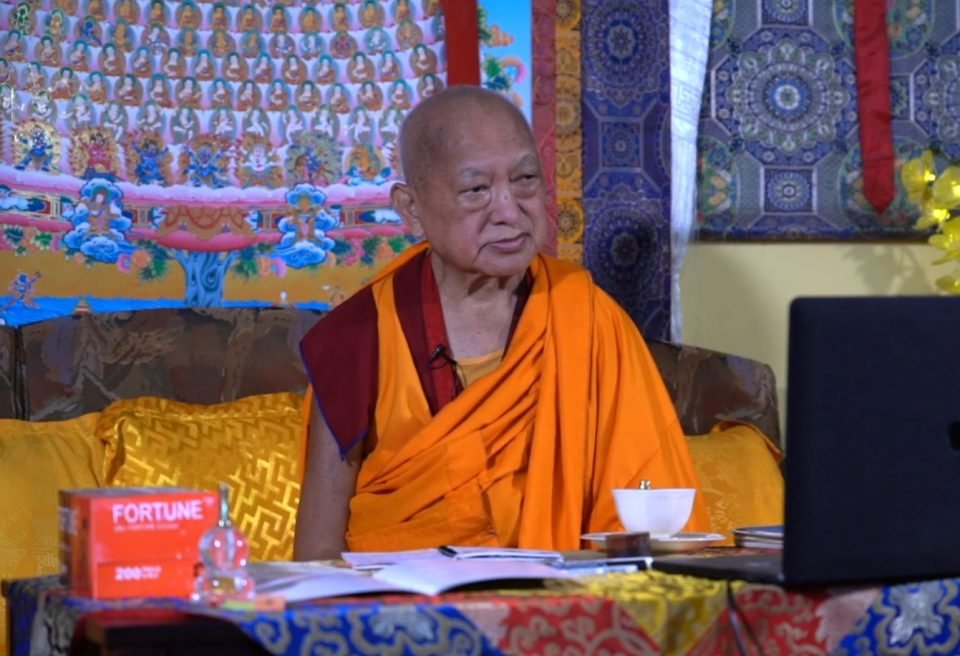
Lama Zopa Rinpoche giving “The Real Refuge Practice is Cherishing Sentient Beings” teaching on June 12, 2022 from Kopan Monastery.
Lama Zopa Rinpoche continues his video teachings on thought transformation from Kopan Monastery in Nepal. Here is a summary of a teaching he offered to students from China and Malaysia via Zoom on June 12:
By taking refuge in the Dharma, we should stop harming sentient beings, Rinpoche reminds us. And more than that, we should benefit them. In fact, the real refuge practice is cherishing sentient beings. If we take care of them the most, if we cherish them the most, that is the best offering to all the Buddhas, Dharma, and Sangha. To show respect for everyone is the best practice.
There are many ways to benefit others, including animals. For example, we can help the animals in meat shops by praying for them. Rinpoche shares that he prays in this way when he passes meat shops, “Due to all the past, present, and future merits collected by me and all the three-time merits collected by numberless sentient beings, and the three-time merits collected by numberless buddhas, may all these animals that were killed in all the past days and in the future—as well as the people and the butchers who participated—may they never get reborn in the lower realms again. May they be born in a pure land where they can be enlightened immediately. Or, may they receive a perfect human body, meet the Mahayana teachings, meet a perfectly qualified Mahayana guru revealing the unmistaken path to enlightenment, and by pleasing that guru, may they achieve enlightenment. By seeing that guru as a buddha, may they achieve enlightenment.”
We can also explain to others that if they stop harming animals they will receive happiness. Of course, they may get angry and this depends on an individual’s skill, but this is one way to help others. It’s one of the little things we can do for others.
Sentient beings are so precious because the Buddha, Dharma, and Sangha came from them. Even those who we call enemy, who get angry with us, who harm us with their body, speech, and mind. These people are unbelievably precious because Buddha, Dharma, and Sangha come from them as well. The more we realize the kindness of sentient beings, the more we will dedicate our life to them.
Throughout this teaching, Rinpoche also continues to discuss what to abandon and what to practice after having taken refuge in the Sangha at (17:49 – 44:17 ) in the video, and on pages 4-10 in the transcript.
We invite you to go deeper into the topics presented here, plus many others, by watching Rinpoche’s video and reading the full transcript of Rinpoche’s teaching.
Watch Lama Zopa Rinpoche’s teaching “The Real Refuge Practice Is Cherishing Sentient Beings”:
- Read the transcript of Rinpoche’s teaching
- Find Rinpoche’s Teachings on Thought Transformation translated into various languages.
- Dedication verses
Summary of Lama Zopa Rinpoche’s teaching by Carina Rumrill based on the transcript by Ven. Joan Nicell with editorial input and additions by Justin Jenkins. This summary is meant to highlight key topics presented by Rinpoche in the recorded video and is not intended to serve as a full representation of Rinpoche’s teaching, which is best received through watching the video and/or reading the full transcript.
Watch more from the video series Lama Zopa Rinpoche’s Teachings on Thought Transformation and find links to videos in transcripts, MP3s, additional practice advice, and more:
https://fpmt.org/fpmt/announcements/resources-for-coronavirus-pandemic/advice-from-lama-zopa-rinpoche-for-coronavirus/
Lama Zopa Rinpoche is the spiritual director of the Foundation for the Preservation of Mahayana Tradition (FPMT), a Tibetan Buddhist organization dedicated to the transmission of the Mahayana Buddhist tradition and values worldwide through teaching, meditation and community service.
- Tagged: advice from lama zopa rinpoche, coronavirus, lama zopa rinpoche thought transformation video teaching, refuge, video
15
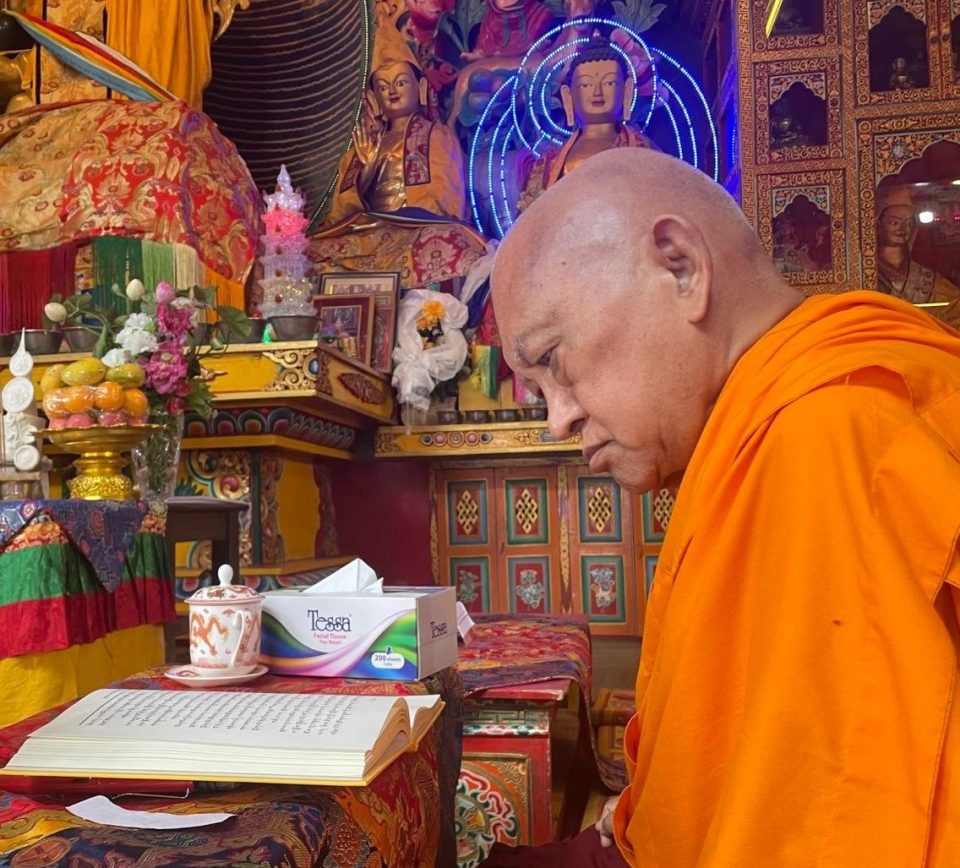
Rinpoche receiving the oral transmissions from Geshe Thupten Rinchen, April 23, 2022. Photo by Ven. Thubten Tendar.
Since our last update, Lama Zopa Rinpoche has remained in Nepal before traveling to Singapore for a simple medical procedure, engaging in a variety of auspicious activities, including maximizing every moment of merit-multiplying Saka Dawa and continuing to offer teachings to a variety of audiences. Rinpoche ordained new Sangha at Kopan Monastery in May, offered a mandala at the inauguration of a new building for the Nepal Buddhist Gelug Association on June 8, and visited the Karuna Hospital on June 21 offering advice on death and dying to the staff. Rinpoche met with Telo Rinpoche at Kopan May 9 and with the incarnation of Trulshik Rinpoche on May 16.
We invite you to read more about some of these activities below and to join us in rejoicing in the compassionate service Rinpoche offers every day, inspiring us all to live a full and beneficial life.
Rinpoche’s Health Update
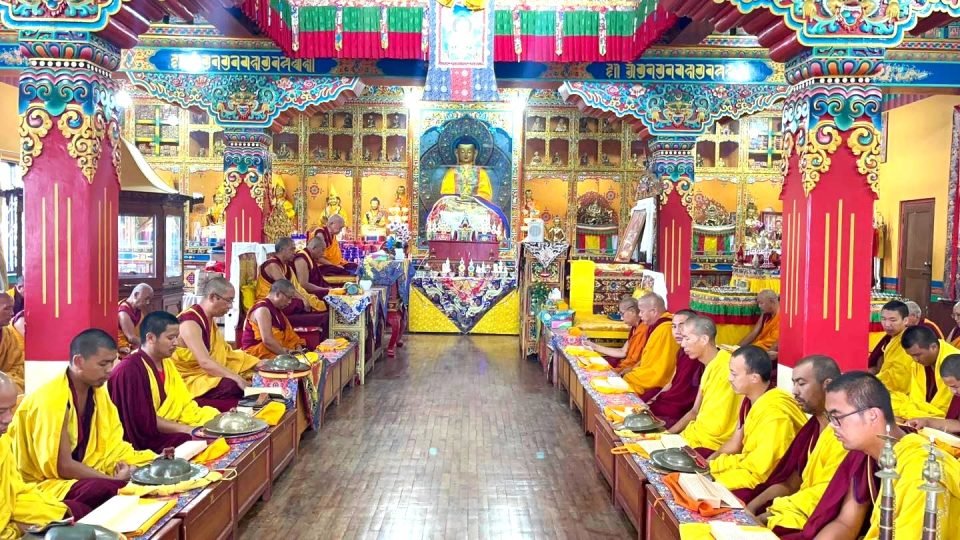
Most Secret Hayagriva tsog kong offered to Lama Zopa Rinpoche for his long life, Kopan Monastery, Nepal, June 24, 2022.
Earlier this month, Rinpoche traveled to Singapore for a simple medical procedure. Rinpoche is recovering well from this procedure and students around the world participated in the advice given by Khandro Kunga Bhuma for Rinpoche’s health at this time. We also invite you to rejoice in the various practices that have been done and planned for Rinpoche’s health this year:
- A White Tara long life puja was offered on March 11, 2022, at Kopan Monastery. This special long life puja involved seven days of preparation led by Khandro-la with the Kopan monks.
- In March, Khandro-la advised that students recite Chenrezig and White Tara mantras for His Holiness the Dalai Lama and Lama Zopa Rinpoche’s health, for the fulfilment of all their wishes, and for the benefit of all in the FPMT organization. Incredibly, during the most meritorious period from Losar up to and including the last of the Days of Miracles, Chotrul Duchen, a total of 12,719,479 mani mantras and 1,759,396 White Tara mantras were offered by FPMT students and centers around the world.
- In May, Khandro-la advised FPMT students to recite refuge and bodhicitta prayers, and FPMT students and centers around the world have been offering these prayers.
- An all-day Most Secret Hayagriva tsog kong, was offered by the Kopan Lama Gyupas and senior monks and nuns of Kopan on June 24, 2022.
- 17,417 pounds of cockles were liberated for Rinpoche’s health by Ven. Drachom at Amitabha Buddhist Centre, Singapore.
- Three separate long life deity thangkas were painted and consecrated in one day in July 2022.
- Painting for the three main stupas in Kathmandu was offered in July 2022.
- One horse and ten sheep were liberated in Mongolia in July 2022.
- Lama Chopa long life puja will be offered at Kopan Monastery at the end of the November lamrim course.
- Guru Rinpoche bum tsog and raising of the great thangka of Guru Rinpoche at Kopan Nunnery will happen at the end of 2022.
Teachings
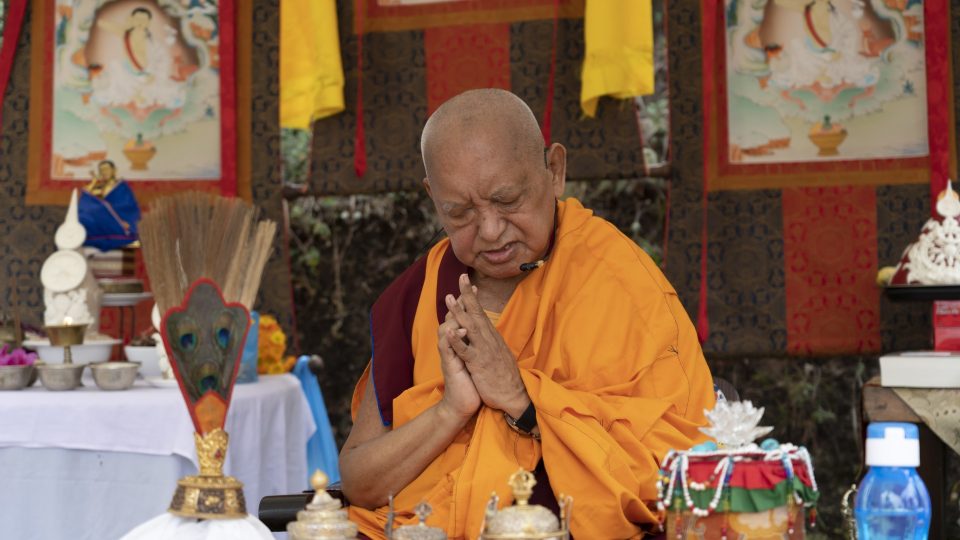
Lama Zopa Rinpoche offering Milarepa initiation, April 6, 2022. Photo by Ven. Lobsang Sherab.
On April 6 Rinpoche offered a Milarepa initiation and teachings to a small group of senior Kopan monks, senior Khachoe Ghakyil Ling nuns, Western sangha, and some lay students. We invite you to watch the teaching that Lama Zopa Rinpoche offered prior to the initiation. A full transcript of this teaching is also available.
Rinpoche gave four teachings to students attending the 2022 Vajrasattva retreat at Kopan Monastery: an introductory teaching on March 30 and three subsequent teachings on April 26–28. You can find all the videos and a combined transcript of these teachings on our page “Teachings for 2022 Vajrasattva Retreatants at Kopan Monastery.
In May the Lama Zopa Rinpoche Essential Extracts Podcast was launched. This podcast captures the essence of Rinpoche’s teachings and each fifteen-to thirty-minute episode is edited and condensed from a longer teaching by Rinpoche and focuses on a single topic. New episodes are released every other Monday and previously published episodes are available as well.
Rinpoche continued offering teachings on refuge to a group of Chinese students via Zoom from Kopan Monastery in June and we will offer these teachings on video with transcripts as soon as they become available.
Rinpoche offered two teachings to Russian students via Zoom from Kopan Monastery at the end of June and we will offer these teachings on video with transcripts as soon as they become available. A third teaching is planned for this group and Rinpoche has indicated that these are complimentary to and a condensed teaching on the thought transformation series that Rinpoche has been giving for the last two and a half years.
Following Rinpoche’s discharge from the hospital in Singapore for the medical procedure, Rinpoche joined the Amitabha Buddhist Centre (ABC) community in Singapore for their special celebration of His Holiness the Dalai Lama’s 87th birthday with puja. Prior to the puja Rinpoche shared, “So thank you very much. Due to all your prayers I’m feeling better. The operation was like a short sleep. I fell asleep, then finished! It was very efficient.”
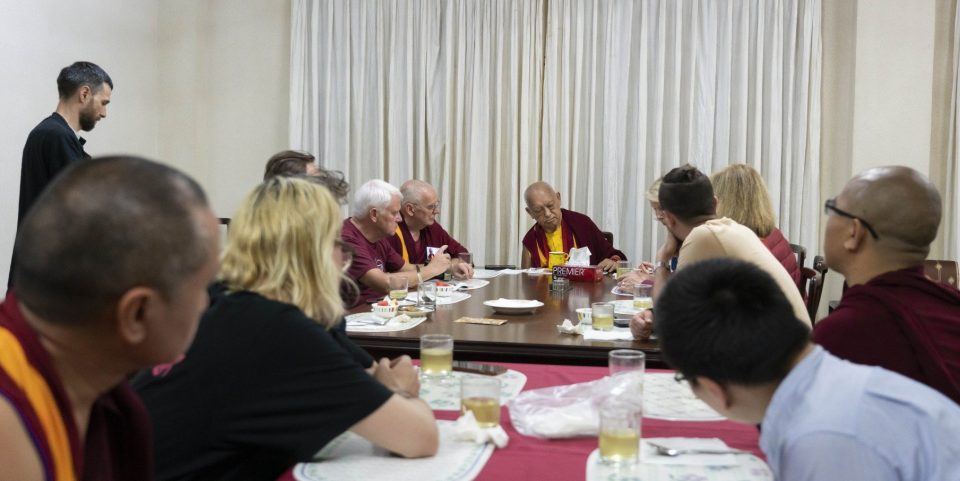
Lama Zopa Rinpoche meeting Russian neuroscientists at Kopan Monastery, Nepal, May 2022. Photo by Ven. Lobsang Sherab.
Scientists Studying Meditation
A group of Russian neuroscientists spent time at Kopan Monastery conducting studies on the monks with respect to meditation and brain waves. Rinpoche met and spoke with them as well. We will be sharing details about this interesting study very soon!
Geshe Thubten Rinchen Lungs
Rinpoche had requested precious oral transmissions (lungs) from Geshe Thubten Rinchen—a great hidden yogi and the main teacher of Sera Mey and Tashi Lhunpo monasteries—several times for the benefit of the Kopan community. From April 15—May 9, 2022, Geshe Rinchen fulfilled Rinpoche’s request and several hundred Kopan monks and nuns, as well as a few others from various locations, received the lungs which were a transmission of parts of the five great texts that are the curriculum of Sera Je Monastery and some of the other great monasteries. You can read more about these lungs.
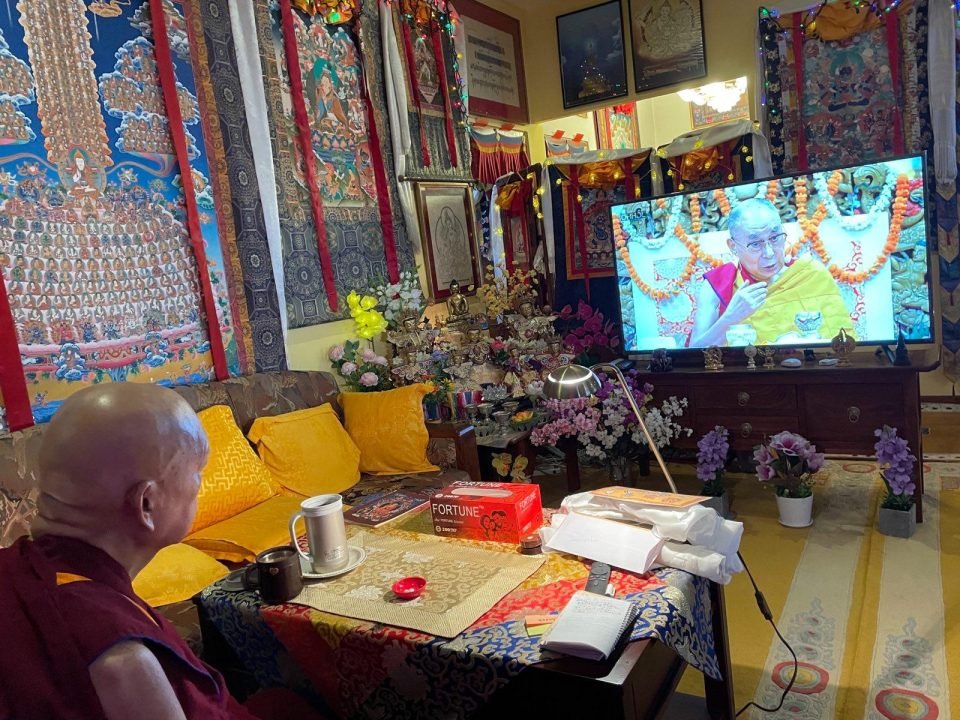
Lama Zopa Rinpoche watching His Holiness the Dalai Lama’s teachings on Saka Dawa, June 14, 2022. Photo by Ven. Lobsang Sherab.
Saka Dawa
On the merit-multiplying day of Saka Dawa, celebrated on June 13 this year, Rinpoche filled every moment with the opportunity to be as beneficial as possible. He attended a teaching with His Holiness via Zoom, attended tsog at Namgyal Jyangchub Choeling Monastery, turning two prayer wheels at once, with 3 trillion mantras in each. He also blessed water and Vaseline with mantras, for those who are sick and continued writing out the Prajnaparamita sutra late into the night.
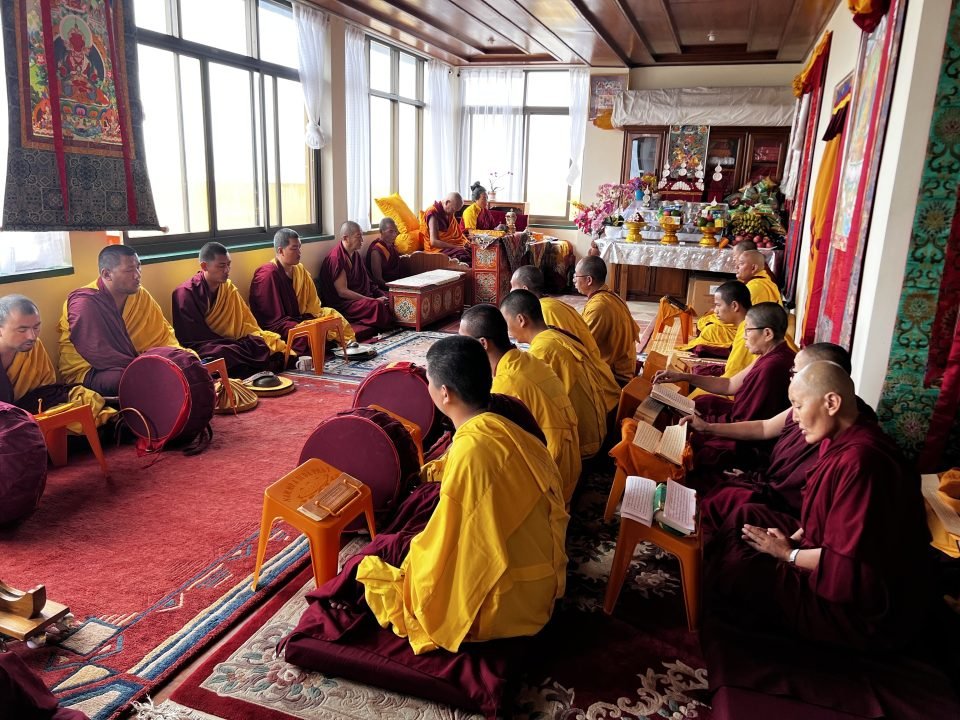
Lama Zopa Rinpoche, Khandro-la, and Kopan Sangha doing Palden Lhamo puja at Kopan Monastery, May 30, 2022. Photo by Ven. Roger Kunsang.
Circumambulating the Kopan Monastery Altar, Boudha Stupa, Swayambhunath
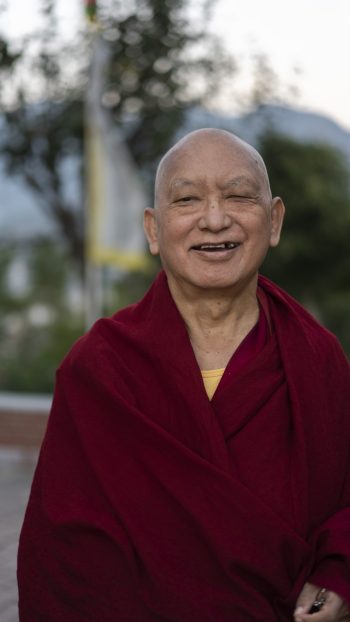
Lama Zopa Rinpoche circumambulating the stupa at Kopan Monastery. Photo by Ven. Lobsang Sherab.
Often Rinpoche circumambulates six times, dedicating each circuit to each of the six realms. Rinpoche also has explained this essential advice when circumambulating: Visualize that all the numberless buddhas, Dharma, and Sangha in the ten directions are in front of you in the form of the stupa as well every single holy object—statue, stupa, scripture, relic, etc.—that exists in every universe anywhere and think that all of these are your root guru integrated into one. You can also visualize the stupa taking the form of the Guru Puja merit field, or a deity such as Chenrezig or Vajrasattva, with the awareness that this is your root guru. The most important thing, Rinpoche stresses, is to always keep the mind in devotion seeing all the holy objects you are circumambulating as a manifestation of your root guru. This is the most skillful meditation for the purification to become most powerful and to collect the most extensive merit. It’s the same meditation whether you are circumambulating a stupa or in your shrine room.
Pujas and Practices
Rinpoche participated in many pujas and practices with others including:
- Yamantaka sadhana recitation with Kopan Lama Gyupas and Geshe Rinchen for the benefit of all beings and to remove all obstacles.
- Tara puja at the special Tara Temple in Kathmandu in April with Geshe Tenzin Zopa, Geshe Thubten Sherab, and the Kopan monks and nuns.
- Lama Chopa Tsog was completed several times at Kopan Monastery and Khachoe Ghakyil Nunnery.
- Palden Lhamo Puja was done with Khandro-la and Kopan Sangha twice in May
- Lama Chopa Puja was done on the occasion of Khyongla Rato Rinpoche passing away on May 24.
We invite you to see more photos of Rinpoche in our April–June 2022 photo album:
https://fpmt.org/teachers/zopa/gallery/nepal-april-june-2022/
Lama Zopa Rinpoche is the spiritual director of the Foundation for the Preservation of Mahayana Tradition (FPMT), a Tibetan Buddhist organization dedicated to the transmission of the Mahayana Buddhist tradition and values worldwide through teaching, meditation and community service.
- Tagged: essential extracts podcast, kopan monaster, lama zopa rinpoche, lama zopa rinpoche activities, singapore
13
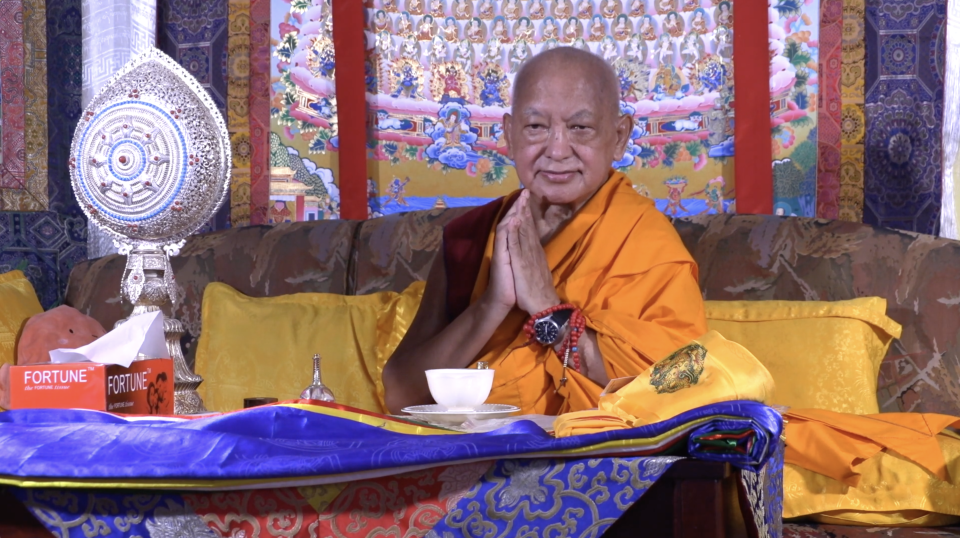
Lama Zopa Rinpoche during the thought transformation teaching, “Having Taken Refuge, What to Abandon and What to Practice,” Kopan Monastery, June 11, 2022.
Lama Zopa Rinpoche continues his video teachings on thought transformation from Kopan Monastery in Nepal. Here is a summary of Rinpoche’s June 11, 2022 teaching which he offered via Zoom to students in China and Malaysia:
Numberless buddhas of the past, present, and future can see our suffering and that we need happiness, Rinpoche explains. They want to help, they want to guide us. However, from our side, if we don’t rely on them by going for refuge, all of their power together cannot guard us, cannot save us, cannot keep us from the lower realms. Therefore, take refuge in Buddha, Dharma, and Sangha so we don’t cheat ourselves. The reason why we have been suffering in samsara from beginningless rebirths is because we haven’t followed the Guru, Buddha, Dharma, and Sangha.
Every happiness and suffering we experience came from the mind, from karma. Therefore, examine one’s body, speech and mind and attempt to abandon negative karma and practice virtue, Rinpoche urges us. We should engage in ethical, healthy, virtuous, positive, and beneficial things which bring happiness to ourselves and to all sentient beings. Just as one protects themselves by following their parents’ good advice, we must protect ourselves by following the Dharma.
The purpose of this life is to not only abstain from harming others, but to cause them happiness. Everyone—from small insects to human beings—wants happiness and not suffering. Benefiting others makes life important.
Rinpoche explains that there is an absolute buddha and a conventional buddha. The absolute buddha is the holy body of the dharmakaya, the omniscient mind, and the ultimate nature of the omniscient mind. The conventional buddha is the buddha which is a truth for the all-obscuring mind—that is the nirmanakaya aspect.
There is an absolute Dharma and a conventional Dharma. The wisdom directly perceiving emptiness is the absolute Dharma. The subjects, the texts, the lamrim—that is the conventional Dharma.
There is the absolute sangha and the conventional sangha. The absolute sangha is the sangha who has a realization directly perceiving emptiness. The conventional sangha has to be four members; even if they don’t have the wisdom directly perceiving emptiness, but are living in 253 pure vows purely—that is the conventional sangha.
Rinpoche discusses what to abandon and what to practice after having taken refuge in Buddha, Dharma, and Sangha at (38:32) in the video and starting on page 10 in the transcript. We recommend listening to this part of the teaching and following along in the transcript, as Rinpoche goes into detail on these points.
Rinpoche also discusses that merit is multiplied 100 million times on special Buddha multiplying days and what to do and how to think when burning holy Dharma to avoid creating negative karma.
We invite you to go deeper into the topics presented here, plus many others, by watching Rinpoche’s video and reading the full transcript of Rinpoche’s teaching.
Watch Lama Zopa Rinpoche’s teaching “Having Taken Refuge What to Abandon and What to Practice “:
- Read the transcript of Rinpoche’s teaching
- Rinpoche is offering commentary on passages that can be found in the practice booklet, Refuge in the Three Jewels
- Find Rinpoche’s Teachings on Thought Transformation translated into various languages.
- Dedication verses
Summary of Lama Zopa Rinpoche’s teaching by Carina Rumrill based on the transcript by Ven. Joan Nicell with editorial input and additions by Francois Lecointre. This summary is meant to highlight key topics presented by Rinpoche in the recorded video and is not intended to serve as a full representation of Rinpoche’s teaching, which is best received through watching the video and/or reading the full transcript.
Watch more from the video series Lama Zopa Rinpoche’s Teachings on Thought Transformation and find links to videos in transcripts, MP3s, additional practice advice, and more:
https://fpmt.org/fpmt/announcements/resources-for-coronavirus-pandemic/advice-from-lama-zopa-rinpoche-for-coronavirus/
Lama Zopa Rinpoche is the spiritual director of the Foundation for the Preservation of Mahayana Tradition (FPMT), a Tibetan Buddhist organization dedicated to the transmission of the Mahayana Buddhist tradition and values worldwide through teaching, meditation and community service.
- Tagged: advice from lama zopa rinpoche, coronavirus, lama zopa rinpoche thought transformation video teaching, refuge, video
6
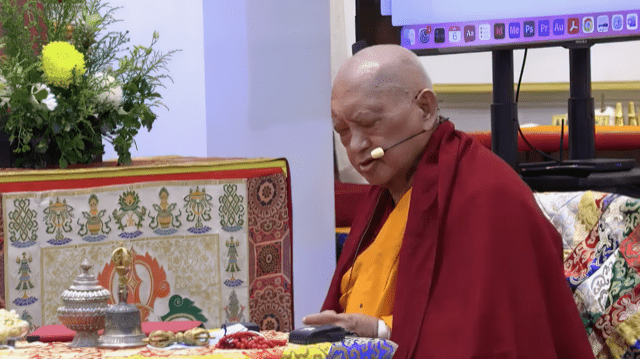
Lama Zopa Rinpoche joined the ABC community in Singapore for a special birthday celebration and puja for His Holiness the Dalai Lama, following Rinpoche’s discharge from the hospital for a simple medical procedure, July 6, 2022.
On Friday we shared the news that Lama Zopa Rinpoche was in Singapore for a simple medical procedure, and Khandro Kunga Bhuma (Khandro-la) advised on particular practices for students to engage in at this time and for a period following the procedure.
We are delighted to share Ven. Roger Kunsang’s most recent update from today:
This morning Rinpoche was discharged from the hospital here in Singapore. The doctor was very pleased with the results of the procedure.
Rinpoche says he is feeling very well and a little bit lighter!
Sincerely,
roger
Following his discharge from the hospital Rinpoche joined the Amitabha Buddhist Centre (ABC) community in Singapore for their special celebration of His Holiness the Dalai Lama’s 87th birthday with puja. Prior to the puja, Rinpoche talked with the group and offered a short teaching. Rinpoche shared, “So thank you very much. Due to all your prayers I’m feeling better. The operation was like a short sleep. I fell asleep, then finished! It was very efficient.”
All are welcome to watch this event which was livestreamed:
We encourage all students to please continue with the recommended prayers and practices advised by Khandro-la until July 15:
- Animal Liberations
Liberating Animals from the Danger of Death
Available from the FPMT Foundation Store: shop.fpmt.org/Liberating-Animals-from-the-Danger-of-Death-PDF_p_1115.html
- Tara Mantra and Tara Praises
Tara Praise and Mantras
Available from the FPMT Foundation Store: shop.fpmt.org/Tara-Praise-and-Mantras-PDF-_p_3582.html
Abbreviated Praise to the Twenty-one Taras
Available from the FPMT Foundation Store: shop.fpmt.org/Abbreviated-Praise-to-the-Twenty-One-Taras-PDF_p_3466.html
- Vajrasattva Mantra to be recited as much as possible
A Short Vajrasattva Meditation Purification with the Four Opponent Powers
Available from the FPMT Foundation Store: shop.fpmt.org/A-Short-Vajrasattva-Meditation-Purification-with-the-Four-Opponent-Powers-eBook-PDF_p_1223.html
- Padmasambhava Prayers
Recitations of The Prayer to Guru Rinpoche that Spontaneously Fulfills All Wishes (Sampa Lhundrupma)
Available for download: https://fpmt.app.box.com/s/d09kz5j5gzk1z0eggx8dr5hfaqt565lz
Recitations of The Supplication to Guru Rinpoche Clearing the Obstacles on the Path (Barchey Lamsel)
Available for download: https://fpmt.app.box.com/s/rmlbbci39tsyihe2lt00gf50iwuv8kxw
Students can also recite the long life prayer that Khandro Kunga Bhuma composed for Lama Zopa Rinpoche in 2016.
A complete list of the long life prayers for Lama Zopa Rinpoche is available to all.
Lama Zopa Rinpoche is the spiritual director of the Foundation for the Preservation of Mahayana Tradition (FPMT), a Tibetan Buddhist organization dedicated to the transmission of the Mahayana Buddhist tradition and values worldwide through teaching, meditation and community service.
Visit our Long Life Puja Fund page to learn more about the purpose of long life pujas and opportunities to offer support for them.
1
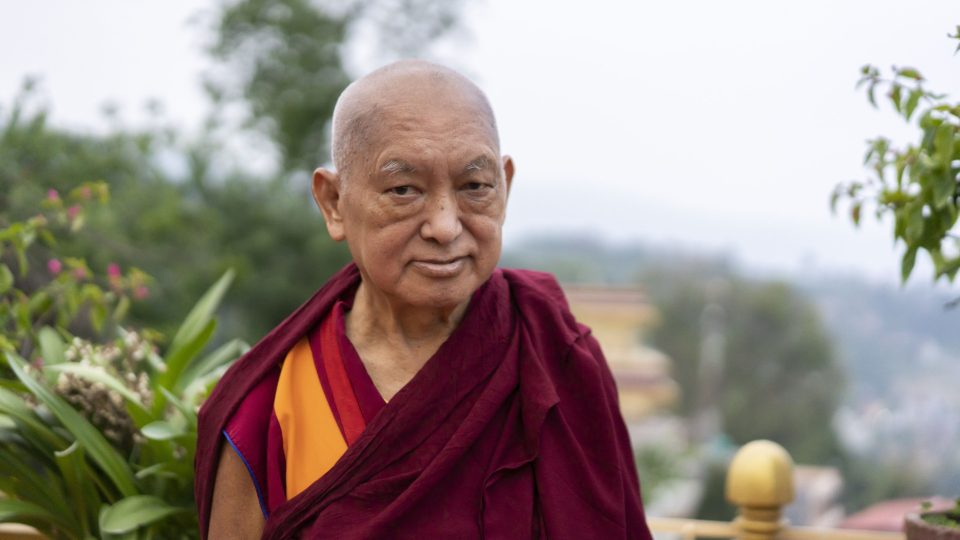
Lama Zopa Rinpoche at Kopan Monastery, May 2022. Photo by Ven. Lobsang Sherab.
Every year Ven. Roger Kunsang, on behalf of the FPMT organization, consults Khandro Kunga Bhuma to determine what practices should be done to help create the conditions for Lama Zopa Rinpoche to have a long life and good health for the coming year. Khandro-la also offers advice as necessary for Rinpoche’s health. Rinpoche is now in Singapore for a simple medical procedure and Ven. Roger has just shared some new advice from Khandro-la which all FPMT centers, projects, services, and students are being asked to engage in as soon as possible and to continue over the next two weeks for Rinpoche’s health:
Current Advice for Lama Zopa Rinpoche’s Health
- Animal Liberations
Liberating Animals from the Danger of Death
Available from the FPMT Foundation Store: shop.fpmt.org/Liberating-Animals-from-the-Danger-of-Death-PDF_p_1115.html
- Tara Mantra and Tara Praises
Tara Praise and Mantras
Available from the FPMT Foundation Store: shop.fpmt.org/Tara-Praise-and-Mantras-PDF-_p_3582.html
Abbreviated Praise to the Twenty-one Taras
Available from the FPMT Foundation Store: shop.fpmt.org/Abbreviated-Praise-to-the-Twenty-One-Taras-PDF_p_3466.html
- Vajrasattva Mantra to be recited as much as possible
A Short Vajrasattva Meditation Purification with the Four Opponent Powers
Available from the FPMT Foundation Store: shop.fpmt.org/A-Short-Vajrasattva-Meditation-Purification-with-the-Four-Opponent-Powers-eBook-PDF_p_1223.html
- Padmasambhava Prayers
Recitations of The Prayer to Guru Rinpoche that Spontaneously Fulfills All Wishes (Sampa Lhundrupma)
Available for download: https://fpmt.app.box.com/s/d09kz5j5gzk1z0eggx8dr5hfaqt565lz
Recitations of The Supplication to Guru Rinpoche Clearing the Obstacles on the Path (Barchey Lamsel)
Available for download: https://fpmt.app.box.com/s/rmlbbci39tsyihe2lt00gf50iwuv8kxw
In addition, Ven. Roger reports that pujas are being arranged in monasteries and nunneries in India and Nepal for Rinpoche’s health at this time.
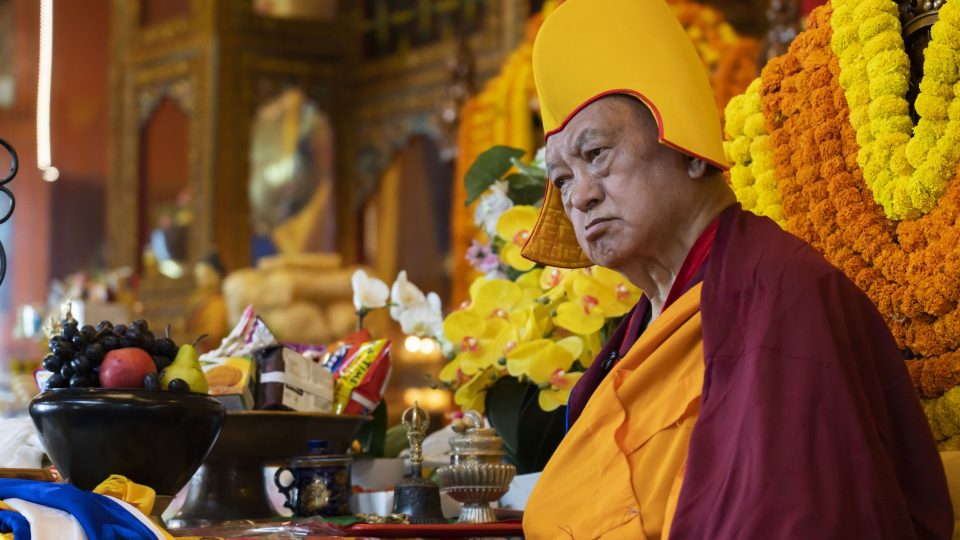
Lama Zopa Rinpoche during the long life puja offered to him, March 11, 2022, Kopan Monastery. Photo by Ven. Lobsang Sherab.
Completed and Planned Practices for Lama Zopa Rinpoche’s Health in 2022
We also ask you to join us in rejoicing in the following which has been completed and planned for Rinpoche as advised.
- A White Tara long life puja was offered on March 11, 2022, at Kopan Monastery. This special long life puja involved seven days of preparation led by Khandro-la with the Kopan monks.
- In March, Khandro-la advised that students recite Chenrezig and White Tara mantras for His Holiness the Dalai Lama and Lama Zopa Rinpoche’s health, for the fulfilment of all their wishes, and for the benefit of all in the FPMT organization. Incredibly, during the most meritorious period from Losar up to and including the last of the Days of Miracles, Chotrul Duchen, a total of 12,719,479 mani mantras and 1,759,396 White Tara mantras were offered by FPMT students and centers around the world.
- In May, Khandro-la advised FPMT students to recite refuge and bodhicitta prayers, and FPMT students and centers around the world have been offering these prayers.
- An all day Most Secret Hayagriva tsog kong, was offered by the Kopan Lama Gyupas and senior monks and nuns of Kopan on June 24, 2022.
- 17,417 pounds of cockles were liberated for Rinpoche’s health by Ven. Drachom at Amitabha Buddhist Centre, Singapore.
- Three long life deity thangkas will be painted and consecrated in one day in July 2022.
- Painting for the three main stupas in Kathmandu will be offered in July 2022.
- One horse and ten sheep will be liberated in Mongolia in July 2022.
- Lama Chopa long life puja will be offered at Kopan Monastery at the end of the November lamrim course.
- Guru Rinpoche bum tsog and raising of the great thangka of Guru Rinpoche at Kopan Nunnery will happen at the end of 2022.
Please join the entire FPMT community by engaging in these powerful advised practices for the long life and health of our most precious spiritual director, Lama Zopa Rinpoche.
Students can also recite the long life prayer that Khandro Kunga Bhuma composed for Lama Zopa Rinpoche in 2016.
A complete list of the long life prayers for Lama Zopa Rinpoche is available to all.
Lama Zopa Rinpoche is the spiritual director of the Foundation for the Preservation of Mahayana Tradition (FPMT), a Tibetan Buddhist organization dedicated to the transmission of the Mahayana Buddhist tradition and values worldwide through teaching, meditation and community service.
Visit our Long Life Puja Fund page to learn more about the purpose of long life pujas and opportunities to offer support for them.
- Tagged: lama zopa rinpoche long life, long life
23
All About Vajrasattva
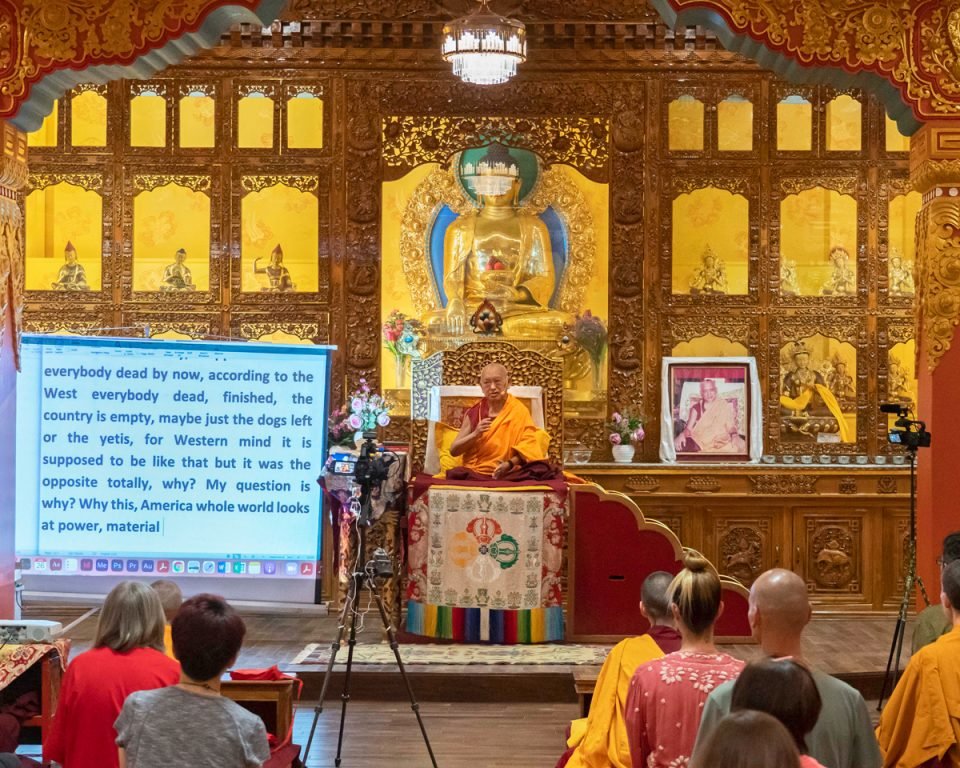
Lama Zopa Rinpoche giving a teaching to the participants of the three-month Vajrasattva retreat at Kopan Monastery, Nepal, April 2022. Photo by Ven. Lobsang Sherab.
Lama Zopa Rinpoche gave this teaching to students attending the three-month Vajrasattva retreat at Kopan Monastery in Nepal on April 28, 2022. Here’s a summary of Rinpoche’s teaching. You can find the video of the teaching and a link to the transcript below.
Whether you believe in karma or not, your negative karma increases without purification. It doesn’t matter if you are a believer or a nonbeliever. Rinpoche gives the example of a doctor saying you have cancer, but you believe you don’t have cancer. Does that help? Does this mean you don’t have cancer? Without purification, karma continues to increase until it becomes like a mountain. Without practicing Vajrasattva, a small negative karma increases day by day, week by week, month by month, year by year. Each time you do the Vajrasattva practice, your mind becomes clean. However, even though you can purify negative karma, by committing mistakes again and again, your realizations become postponed. You can continue to make mistakes and purify through Vajrasattva, but what happens is that it becomes harder and harder to have realizations on the path; your progress is postponed. This is important to remember.
The greatest purification one can do is to please the guru’s holy mind by fulfilling their wishes and advice. This is also the greatest way of collecting extensive merits and the quickest way to achieve enlightenment.
Rinpoche discusses the Four Opponent Powers, which is essential to Vajrasattva practice (starting at 1:12:14 in the video):
- The Power of Reliance
- The Power of Reflecting on the Shortcomings of Negative Karma (the Power of Regret)
- The Power of Always Engaging in the Remedy
- The Power of Not Committing the Negative Karma (Faults) Again
Reciting the Vajrasattva mantra pleases your karmically connected deity and purifies negative karma and stops it from increasing.
There is the hundred syllable mantra, which is recited twenty-one times. But if we can’t recite that, there is: OM VAJRASATTVA HUM, which is recited twenty-eight times.
Rinpoche then discusses the meanings of both mantras and offers instruction for the visualizations and meditations to be done when reciting the mantras (starting at 1:24:48 in the video).
By practicing Vajrasattva, we can purify the five heavy negative karmas without break which cause us to be reborn in hell; and we can achieve the general and sublime realizations. This is why Rinpoche stresses that Vajrasattva practice is so important.
We invite you to go deeper into the topics presented here, plus many others, by watching Rinpoche’s video or reading the full transcript of Rinpoche’s teaching.
Watch Lama Zopa Rinpoche’s teaching “All About Vajrasattva”:
Lama Zopa Rinpoche gave four teachings to students attending the 2022 Vajrasattva retreat: an introductory teaching on March 30 and three subsequent teachings on April 26–28, 2022. You can find all the videos and a combined transcript on our page “Teachings for 2022 Vajrasattva Retreatants at Kopan Monastery.”
Find links to resources to support your Vajrasattva practice in the Foundation Store.
This summary of Lama Zopa Rinpoche’s teaching is by Carina Rumrill, based on the live transcript by Ven. Joan Nicell and checked by Laura Haughey, with editorial input and additions by Laura Miller. This summary is meant to highlight key topics presented by Rinpoche in the recorded video and is not intended to serve as a full representation of Rinpoche’s teaching, which is best received through watching the video and/or reading the full transcript.
Lama Zopa Rinpoche is the spiritual director of the Foundation for the Preservation of Mahayana Tradition (FPMT), a Tibetan Buddhist organization dedicated to the transmission of the Mahayana Buddhist tradition and values worldwide through teaching, meditation and community service.
- Tagged: advice from lama zopa rinpoche, vajrasattva, video
21
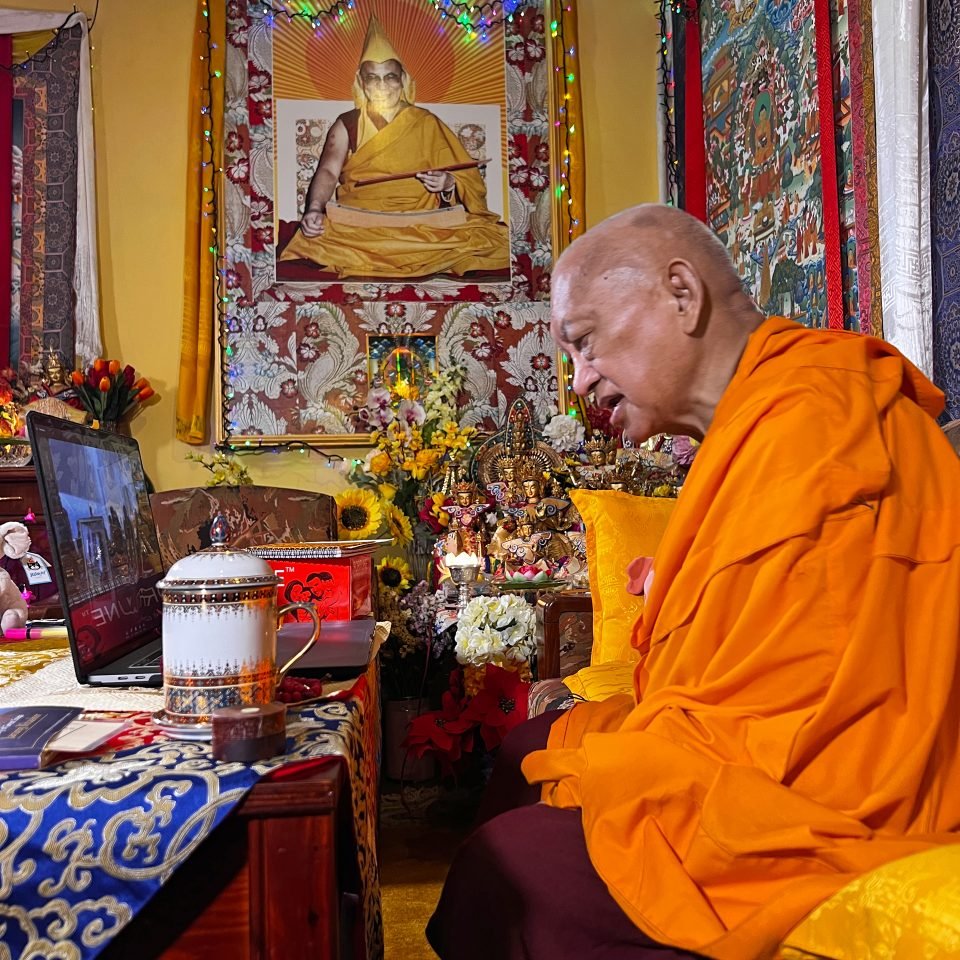
Lama Zopa Rinpoche teaching via Zoom to students in Israel, Kopan Monastery, Nepal, June 2020. Photo by Ven. Roger Kunsang.
Lama Zopa Rinpoche gave a teaching over Zoom about Buddhist refuge for the graduation ceremony of the first cohort of Human Spirit, an Israel-based Buddhist-psychoanalytic training program. Here’s a summary of Rinpoche’s teaching, which was offered on June 8, 2022, from Kopan Monastery in Nepal. You can find the video of the teaching and a link to the transcript below.
All happiness and suffering come from the mind, not from the outside, Rinpoche reminds us. Since we want happiness and don’t want suffering, the vast subject of the mind should be of utmost importance for us to investigate. To become healthy—both physically and mentally—we practice meditation, study the Dharma, and learn about the mind in order to clean it up. A negative and unhealthy mind brings sickness and suffering in so many forms. By continuing with effort to clean up the mind, going deeper and deeper through meditation and analysis, you can completely cease delusions and karma and remove the cause of suffering.
By realizing the ultimate nature of the mind—the ultimate nature of I—then we can develop wisdom and realize emptiness. This is ultimate Dharma. The real refuge is ultimate Dharma. This is like taking medicine; it ceases the cause of suffering, delusions, and karma. Since Buddha revealed the path, in the analogy of medicine, Buddha is the doctor. You take refuge in the Buddha when you take refuge in the Dharma, the teachings of the Buddha. And the Sangha are those who help you actualize the absolute Dharma and understand conventional Dharma through the scriptures. So this is why we take refuge in the Sangha.
Anger makes us very frightening and ugly, and causes us to want to harm others. So much negative karma of the body, speech, and mind are created when we view others as the enemy. This is why the benefits of practicing patience are unbelievable. By completing the perfection of patience, it is impossible for anger to arise. All the gross and subtle obscurations are ceased, purified. Then the mind becomes an enlightened mind. When the mind becomes enlightened, we can liberate the numberless sentient beings from suffering. This is the ultimate benefit to oneself and others, unlike anger which only harms self and others. When you practice patience, there is no enemy. In this way, the person who gives you an opportunity to practice patience is the most precious one in your life!
We invite you to go deeper into the topics presented here, plus many others, by watching Rinpoche’s video and reading the full transcript of Rinpoche’s teaching.
Watch Lama Zopa Rinpoche’s teaching “The Real Refuge Is Your Wisdom Realizing the Ultimate Nature”:
Read the transcript of Rinpoche’s teaching.
This summary of Lama Zopa Rinpoche’s teaching is by Carina Rumrill, based on the live transcript by Ven. Joan Nicell and checked by Laura Haughey, with editorial input and additions by Laura Miller. This summary is meant to highlight key topics presented by Rinpoche in the recorded video and is not intended to serve as a full representation of Rinpoche’s teaching, which is best received through watching the video and/or reading the full transcript.
Find resources to support your practice of refuge, including video teachings from Rinpoche as well as FPMT Education’s practice materials and programs.
You can learn more about Human Spirit in our 2016 story “Human Spirit: Bridging Buddhism and Psychoanalysis in Israel.”
Lama Zopa Rinpoche is the spiritual director of the Foundation for the Preservation of Mahayana Tradition (FPMT), a Tibetan Buddhist organization dedicated to the transmission of the Mahayana Buddhist tradition and values worldwide through teaching, meditation and community service.
- Tagged: advice from lama zopa rinpoche, refuge, video
2
There Are No Limits to the Benefits of Bodhicitta
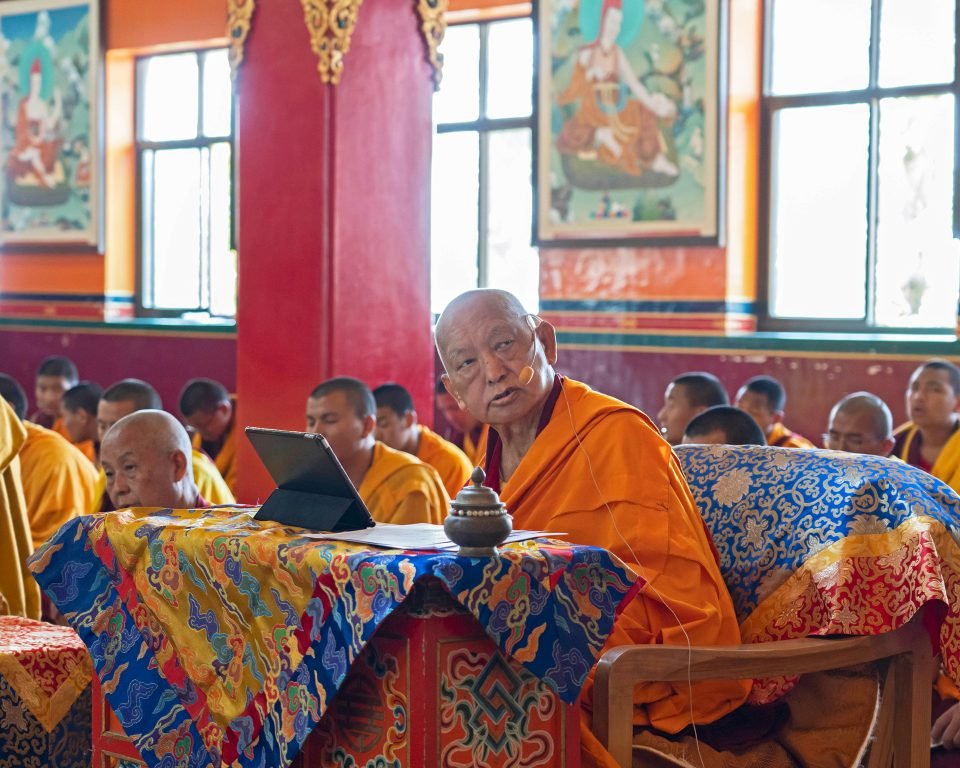
Lama Zopa Rinpoche in the Kopan Monastery gompa, Nepal, May 2022. Photo by Ven. Lobsang Sherab.
Lama Zopa Rinpoche begins this video, which was recorded in April 2018 at the Great Stupa of Universal Compassion in Bendigo, Australia, by reminding us of the benefits of making even a tiny offering to a holy object. But, Rinpoche explains, those benefits are far exceeded by the mere thought of benefiting sentient beings.
Rinpoche quotes from Lama Atisha’s Lamp of the Path to Enlightenment:
Gang gi thäl mo jar gyi te
Jang chhub tu ni sem tü na
Chhö pa di ni kyä par phag
De la tha ni ma chhi so
This is surpassed by
The offering of putting the palms together
And generating bodhicitta,
For such is limitless.
Rinpoche then mentions a quotation on bodhicitta from Shantideva’s Bodhicharyavatara:
Phän par sam pa tsam gyi kyang
Sang gyä chö lä khyä phag na
Even the mere thought to benefit someone
Surpasses making offerings to the buddhas.
Rinpoche explains how it is shown that the mere thought of benefiting a single sentient being, surpasses skies of offerings done to all the buddhas.
When our motivation is to achieve enlightenment for the numberless sentient beings, to free them from the oceans of samsaric sufferings and bring them to peerless happiness, the total cessation of obscurations and completion of realizations, this is truly incredible, because it is for all sentient beings. So this creates an unbelievable amount of merit. And it is so important to remember the benefits of bodhicitta.
Watch the video “There Are No Limits to the Benefits of Bodhicitta”:
The above video is extracted from a teaching given on April 13, 2018, at the Great Stupa of Universal Compassion in Bendigo, Australia. You can find more blogs with short video clips from Rinpoche’s teaching as well as the complete collection of these “Essential Extracts” videos on FPMT.org.
Lama Zopa Rinpoche is the spiritual director of the Foundation for the Preservation of Mahayana Tradition (FPMT), a Tibetan Buddhist organization dedicated to the transmission of the Mahayana Buddhist tradition and values worldwide through teaching, meditation and community service.
- Home
- News/Media
- Study & Practice
- About FPMT Education Services
- Latest News
- Programs
- New to Buddhism?
- Buddhist Mind Science: Activating Your Potential
- Heart Advice for Death and Dying
- Discovering Buddhism
- Living in the Path
- Exploring Buddhism
- FPMT Basic Program
- FPMT Masters Program
- FPMT In-Depth Meditation Training
- Maitripa College
- Lotsawa Rinchen Zangpo Translator Program
- Universal Education for Compassion & Wisdom
- Online Learning Center
- Prayers & Practice Materials
- Overview of Prayers & Practices
- Full Catalogue of Prayers & Practice Materials
- Explore Popular Topics
- Benefiting Animals
- Chenrezig Resources
- Death & Dying Resources
- Lama Chopa (Guru Puja)
- Lama Zopa Rinpoche: Compendium of Precious Instructions
- Lama Zopa Rinpoche: Life Practice Advice
- Lama Zopa Rinpoche Practice Series
- Lamrim Resources
- Mantras
- Prayer Book Updates
- Purification Practices
- Sutras
- Thought Transformation (Lojong)
- Audio Materials
- Dharma Dates – Tibetan Calendar
- Translation Services
- Publishing Services
- Teachings and Advice
- Find Teachings and Advice
- Lama Zopa Rinpoche Advice Page
- Lama Zopa Rinpoche: Compendium of Precious Instructions
- Lama Zopa Rinpoche Video Teachings
- ༧སྐྱབས་རྗེ་བཟོད་པ་རིན་པོ་ཆེ་མཆོག་ནས་སྩལ་བའི་བཀའ་སློབ་བརྙན་འཕྲིན།
- Podcasts
- Lama Yeshe Wisdom Archive
- Buddhism FAQ
- Dharma for Young People
- Resources on Holy Objects
- Ways to Offer Support
- Centers
- Teachers
- Projects
- Charitable Projects
- Make a Donation
- Applying for Grants
- News about Projects
- Other Projects within FPMT
- Support International Office
- Projects Photo Galleries
- Give Where Most Needed
- FPMT
- Shop
Translate*
*powered by Google TranslateTranslation of pages on fpmt.org is performed by Google Translate, a third party service which FPMT has no control over. The service provides automated computer translations that are only an approximation of the websites' original content. The translations should not be considered exact and only used as a rough guide.My religion is kindness to all







